TORONTO (May 1) — I had a brief conversation with a friend of mine on Tuesday… a virulent fan of the Toronto Maple Leafs. “Y’know what? I’m not even looking forward to next season,” he griped. “I mean, what’s there to get excited about? It’s the same old, same old every year. Nothing’s gonna change.”
I comforted my pal (I think) by suggesting it is far–too–soon to make a pledge about the 2019–20 season given the latest playoff disappointment is still so fresh (nor, I reminded him, did Toronto lose Round 1 to a bunch of bums). I also pointed out that the Leafs have given their zealots, through the years, more reasons than there galaxies in the universe to turn away from the club… only to somehow regenerate enthusiasm well before the following season. Which will happen, one way or another, yet again. The enduring mentality of hockey in this region can be ascribed, I’m certain, to chasing the improbable dream. Bouncing back from heartache and forgiving the Maple Leafs has become a quasi–religion. Only the calendar changes. Later in the day, however, I reconsidered my friend’s remorse and begun to comprehend his point more clearly.
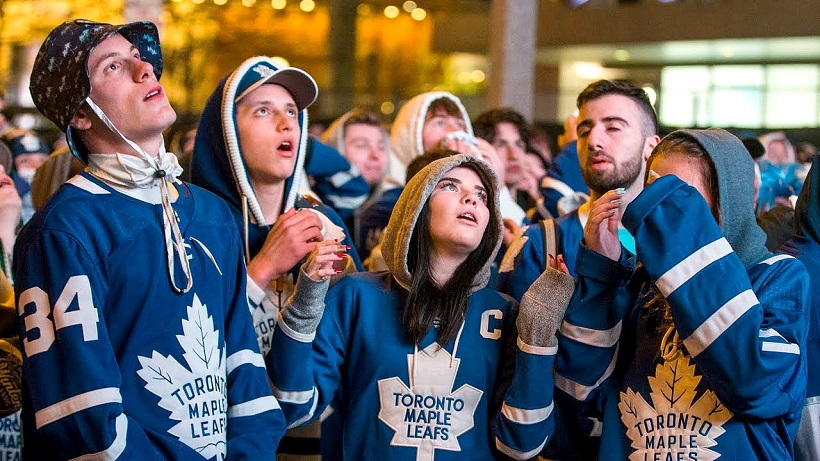
In the years of the so–called “Shanaplan”, we are truly at a crossroad. What started as a means to bottom out and accrue elite draft choices appears to have reached a plateau. It worked to near–perfection, as the club selected its young forward nucleus of William Nylander, Mitch Marner and Auston Matthews in consecutive years. From a fan’s perspective, there was much optimism when the Leafs made the 2017 Stanley Cup playoffs in a full, 82–game schedule for the first time in 13 seasons. A six–game, opening–round series against Washington could have gone either way, as a record five matches extended to overtime — including the finale, won by Marcus Johansson of the Capitals at the Air Canada Centre. The first round of 2018, against Boston, went a step further; Toronto losing agonizingly in a third–period collapse of Game 7 at TD Garden. But, the enthusiasm reached a peak when John Tavares came aboard in free agency last summer and the Leafs began the regular season as a mirror–image of the Wayne Gretzky–led Edmonton Oilers in the 1980’s. The opening–round rematch against Boston this spring was considered a “pick ’em” by most observers… and very much in favor of the Leafs after a commanding Game 5 effort on the road. That Toronto could not close out the series at home in Game 6; then performed rather ineptly in Game 7 at the TD Garden, brought us to where we are today — and spawned the emotional reservation from my friend.
To wit: What will fans of the Blue and White hang their hats on this summer? I can guarantee that another John Tavares won’t be coming down the pike. If anything, the Leafs are going to lose personnel in the salary–cap crunch that awaits general manager Kyle Dubas — defensemen Jake Gardiner and Ron Hainsey sure to depart along with, likely, one of Kasperi Kapanen, Andreas Johnsson or Nylander (who turns 23 today). How else will Dubas afford the contract of Marner after the most–prolific Leafs season (94 points) in nearly a quarter–century? Young Mitch is likely to command a $9–10 million cap–hit; the club therefore committing close to $40 million (or nearly half the cap limit) to four players: Marner, Nylander, Tavares and Matthews. It’s an old story but one that will not disappear. Additionally, and unless Patrick Marleau consents to waive his no–movement clause, another $6.25–million of cap space goes toward a 40–year–old future Hall–of–Famer with not much left in the tank. So, yeah: Where’s the excitement for next season coming from?
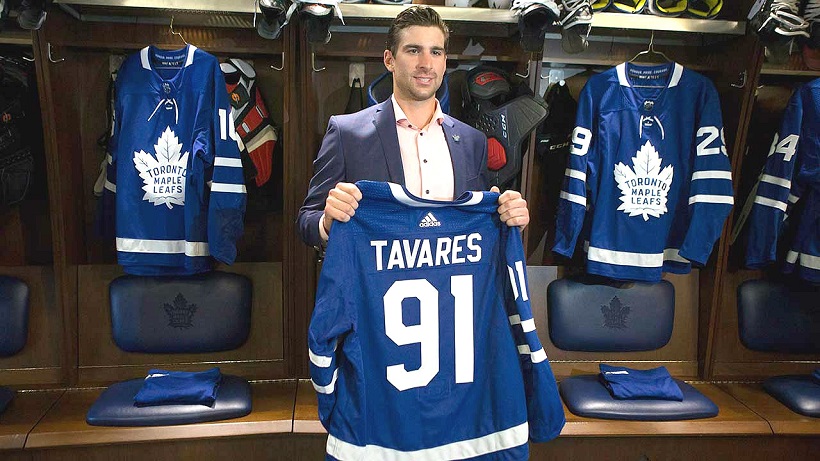
THERE WILL BE NO REPEAT OF THIS BEFORE NEXT SEASON. SO, HOW DO LEAF FANS RAMP IT UP YET AGAIN?
The answer, if there is one, may emanate from necessity.
The Leafs will change. And, perhaps for the better. If Dubas can swing an adroit trade this summer to enhance the club, physically — and even if it costs one of Nylander or Kapanen — there will still be more–than enough firepower and skill up front. The uncertainty, as always with the Maple Leafs, is on the back end. Who replaces Gardiner and Hainsey? Are Calle Rosen and Justin Holl capable of becoming full–time defensemen? Is Rasmus Sandin ready for the big time? While unlikely an issue with management, can Frederik Andersen be counted upon in the clutch? In Game 7 of a playoff series. Though not alone, he has failed the club the past two springs at TD Garden. If he cannot lift his performance at crunch–time in the spring, the Leafs are doomed until they find another stopper. And… will there be a new person standing behind the bench next season? Dubas refused to answer that question last week. If Sheldon Keefe guides the Toronto Marlies into the Calder Cup final for a second spring, will Dubas retain Mike Babcock?
On paper, and unlike last off–season with Tavares, the Leafs aren’t likely to appear of higher quality come October. If anything, they’ll seem diminished. When coupled with the demoralizing hattrick of first–round playoff eliminations, it may indeed be difficult for Maple Leaf supporters to get jacked up in the fall. The club, right now, seems stale and predictable. Enthusiasm, therefore, may need to be manufactured.
And neither is that particularly novel to die–hards of the Blue and White.
EMAIL: HOWARDLBERGER@GMAIL.COM









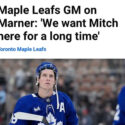







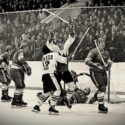












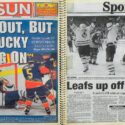

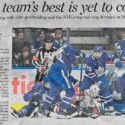


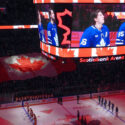
Kyle Dubas on wanting a long-term deal for William Nylander: “The whole time I’m here, until they kick me out one day, William is a part of the group”
Rookie mistake. Big time.
I think the Leafs are going to get worse before they get better. They have just walked through the “first window” of this era, and have come up short. They will lose Gardiner, Hainsey and at least one (possibly two) of their top 9 forwards this summer, meanwhile waiting out Marleau’s contract as he plays in the bottom six. I hate to say it, but it is even possible that they miss the playoffs next year – Tampa and Boston will still be elite teams (if only in the regular season) and if the resurgent Canadiens are “for real” they can easily top 100 points. It might also be time for Buffalo to take flight, like the Islanders did this year in the Met. The bottom line, the Leafs will not be as good (on paper) in October as they are now against the same or stiffer competition in the Atlantic. After next season, with some more cap space and some more prospects ready to go, 20-21 should be the start of a second, more realistic, competitive and mature window of opportunity – one that should last a few years until the end of Matthews’ contract.
Howard, if the Leafs were to regress personnel wise (at least on paper), ever so slightly, should we be shocked if they missed the playoffs next season altogether? One factor that cannot be ignored: The Leafs made the playoffs by mere 4 points over the Habs. A single bad trade/signing could doom the team next season in terms of not making it to the playoffs. Do you agree?
It is no-longer a surprise when a team in the NHL misses the playoffs. Once Seattle comes aboard as the 32nd club, exactly 50% will fail to qualify (unless the format is changed). You are correct. The margin for error is rather-thin.
The Leafs really don’t have to add to be better. They are already one of the most talented teams. Guys like Marner, Matthews, Nylander can still be better.
Also, coaching will determine a lot. If there’s a change and special teams improve and the best players actually play minutes like other stars the team can easily surpass this past season.
Look at the teams in the second round. Do we honestly think the Leafs are below all of them?
You prove the point of my second paragraph.
The reality is, and this always gets overlooked, that the NHL is about to hit 32 teams ..and growing. Every time it expands the cup gets a little further out of reach for everyone. This is a reality that Gary Bettman and the 31 owners don’t want you to ponder. People naturally want to point to Chicago as an example of a good rebuild and they are a good example, but the reality is they are the exception, not the rule. Every team now must build through the draft. There are some advantages teams have through money, resources, but it’s fairly minimal.
Now, the kicker. Over the course of a decade an average of 7 different teams win a cup. That will leave 25 teams, all building from the same resources, unsuccessful in winning a cup over a decade. That’s 80% of the NHL…failing in their rebuild. In short, it’s no more worth getting your undies in a bunch about Maple Leaf failures then it’s worth punching the wall every time your 6/49 tickets come up empty. If this describes you it’s definitely time to find a new passion. One that will actually pay off for you instead of continuously taking a toll on you. Between these percentages and the unique difficulties of trying to figure out how to win a cup under the microscope of Toronto it just ain’t gonna happen folks.